Twenty-five TV series that define the 21st Century
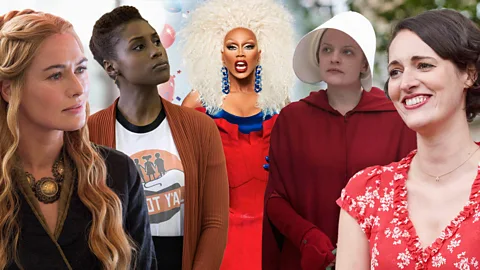 Alamy/ BBC/ Netflix
Alamy/ BBC/ NetflixFrom the dystopian to the surreal, it's been a remarkable two decades in television – and the world. Critics from around the globe reflect on some of the most influential series of the century.
"Television always reveals something about who we are", says TV critic Caryn James. This year's BBC Culture poll rounds up the 100 greatest TV shows of the 21st Century, judged by TV critics and journalists from all over the world. We reflect on how we watch TV in the 21st Century, focus on the poll's winning show, and explore the series that defines the future of TV. In previous iterations of the BBC Culture poll, we have invited critics to write about the 25 films that came top. This year, we instead asked critics from all around the world to reflect on the 25 TV shows that most define the 21st Century. These are the series – listed in no particular order – that are both influential and significant, that have broken new ground, that have reflected life specifically in this century, or that have changed the culture of TV in some way. They are the shows that expose our truths, our hopes, our fears. All of these remarkable TV series tell us something about ourselves, wherever in the world we are from. They all offer something unique to us as viewers: an understanding of our world, an insight into our fellow humans, or, just as important, the chance to laugh at – and find delight in – this century that we are all living in.
Read more about BBC Culture's 100 greatest TV series of the 21st Century:
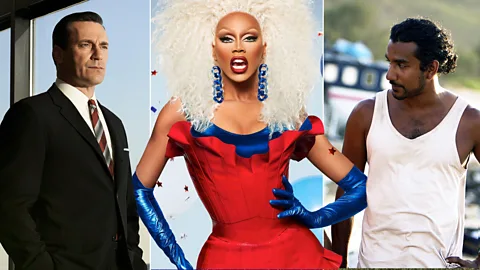 Alamy
AlamyRuPaul's Drag Race
RuPaul's Drag Race is pure joy. It is happiness in a lace-front wig. It is now so ingrained in our everyday life that tongue pops have become a universal language. The show has sashayed its way into the mainstream and into our hearts, and after 12 years it is now a certified phenomenon. Spawning multiple international incarnations, winning awards and transforming the televisual landscape into a more inclusive, more anarchic place. RuPaul and his team took the art of drag from big-city bars and clubs and beamed it into millions of homes, introducing the uninitiated to the world of cinching and tucking – and making stars of its hard-working queens. The competition has managed to subvert the hetero-normative space of reality TV whilst inspiring its legions of fans to take pride in their individuality. Where else on popular TV would you find painfully honest discussions about growing up as a queer person, conversion therapy, trans rights, racism, body image, homelessness, healthcare and homophobia? Drag Race has provided much needed visibility sandwiched between its humour and vivacity. It celebrates performance and artifice, espousing the belief that no matter how bad the game of life gets, we can always recreate ourselves and carry on; we can learn to love ourselves, flaws and all.
Jennifer Gannon, Freelance journalist and broadcaster (Ireland)
Mad Men
"Nostalgia. It's delicate but potent." The maverick but morally dubious Don Draper tells us this very early on in the run of Mad Men and it helps capture the magic behind the rich and haunting quality of Matthew Weiner's 20th-Century period drama, which examines the inner machinations of an advertising agency in New York. Jon Hamm delivered an anti-hero for the ages as Don, but the cast was always an embarrassment of riches. The female characters were especially strong and unique in their own ways, from the quiet ambition of Elisabeth Moss's Peggy Olson to the ive resentments and sadness of January Jones as Betty Draper. Mad Men was a series that always prized character first, rewarding viewers with a vivid and novel-like evocation of a bygone era that truly shows how we are all grappling with the puzzle of marketing ourselves.
Lewis Knight, TV journalist (UK)
Lost
Lost altered the viewing landscape in significant ways, many of which are still being felt 17 years after the disaster drama first crash-landed on TV in 2004. Its creators built a mythology around the show's mysterious island that sent fans down internet rabbit holes to decipher clues, now a common extracurricular practice among the puzzle-box-show obsessed. But they also made us care deeply about their characters, an ethnically-diverse group of wandering souls that reflected an increasingly globally interconnected society. Lost became popular just as social media rose to prominence, making it the first show to generate massive chatter on our new global water coolers: Twitter and Facebook. And at a time when there was some doubt about this, Lost proved that audiences love serial storytelling that demands an investment in a narrative of large scope. This was an absorbing, fun, emotionally enriching series that heightened our expectations for what TV could be in the beginning of the new century – and also showed us what it would look like for decades to come.
Jen Chaney, TV journalist, Vulture, New York Magazine (United States)
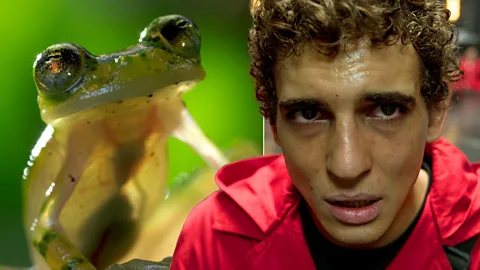 BBC/ Netflix
BBC/ NetflixMoney Heist
When people looked to streaming sites to fill their days during Covid, one show in particular rose above them all, with 65 million viewers in the first four weeks of almost worldwide lockdown: Money Heist. And it's obvious why: Money Heist, or La Casa de Papel, is relentless. This high-tempo thriller was created for 21st-Century viewers, with twists and turns that never disappoint, a clear premise with good pacing and fantastic performances from each actor. When the cat and the mouse cross over, you see how one man's morally grey decision can affect a whole society. If you could take a masterclass in blurring the lines between good and bad, then show creator Álex Pina would be the professor. Although some parts may feel stretched, and viewers might argue about plot holes, there's no denying that fans will stay for love. Money Heist is utterly ridiculous, and we just can't stop watching.
Ingunn Lára Kristjánsdóttir, TV journalist and reporter, Fréttablaðið (Iceland)
Planet Earth
David Attenborough's stunning narration captures the spirit of Planet Earth, an epic series with all the playfulness, curiosity and gravitas of the great man himself. With the threat of the climate crisis and mass extinction of many species, Planet Earth shows us why nature is worth fighting for, as the audience found itself screaming encouragement at an iguana escaping snakes or a walrus protecting its pup from a ravenous polar bear. The initial series (2006) was shot in pioneering HD over five years, and the follow up (2016) took almost six. Behind-the-scenes footage of how some of the more difficult scenes were shot only adds to the magic. Where so many great television shows lead to introspection, Planet Earth asked its audience to look outwards, to see a world full of wonders worth cherishing.
Leila Latif, freelance TV journalist (UK)
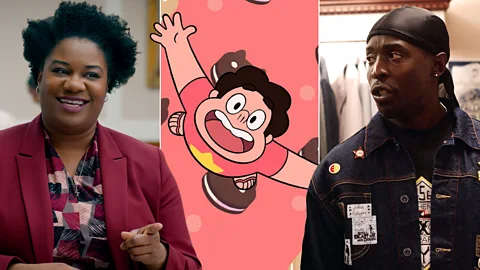 Netflix/ Alamy
Netflix/ AlamyOrange Is the New Black
Traditionally, we – the viewers – are used to watching men in prison. Especially, the tattoo-flaunting, mayhem-spawning baddies that are further toughened by the harsh living conditions within the system. Hence Orange Is the New Black (OITNB), with its focus on a diverse group of female prisoners, came as a breath of fresh air. It was also irably nuanced: there were no good or bad characters in the series, just real people. Despite the shift in hands – multiple directors were involved in the project – the seven-season show never derails or pivots from the foundation it is based on. The show also helped encourage dialogue around socio-political injustices prevalent in the US, which are also relevant to other corners of the world, and dared to talk about life in an ICE (US Immigration and Customs Enforcement) facility. And it really paved the way for more complex female leads of all kinds – whoever they are, whatever "sins" they have committed.
Pallabi Purkayastha, digital journalist, WION (India)
The Wire
The Wire never flinched from ambition. The approach, and the way we as viewers still experience it, was both personal and political, big and small, as it reached for an unspoken truth and still managed to make us laugh, cry and smile. It was a series that informed and entertained. Here, as in every great show, the writing was intertwined with the actors. We cared for almost every face that ed by, however briefly, and we wondered what happened to them after David Simon and Ed Burns focused their lenses elsewhere. The Wire, along with The Sopranos, is the benchmark for great television in the 21st Century; to this date, their novelistic approach to storytelling hasn't been done better, even if many have tried. It is also, and will probably always be, the most humane show ever made.
Mattias Bergqvis, TV journalist, Expressen (Sweden)
Steven Universe
It's hard to say if anyone could have predicted that a kid's cartoon about a magical boy who goes on adventures with aliens would have turned out to be one of the most poignant examinations of gender, colonialism and trauma of our time. But somehow, Steven Universe managed to transcend its origins and build a mythology so vast that it captured the imaginations of adults and children alike. The sometimes-musical series doled out pithy lessons about love and kindness in bite-sized, 11-minute chunks. The titular character brought optimism and earnestness to the unfolding web of generational destruction he was tasked with ending. The show's vast cast of characters gave rise to perfect metaphors for everything from bodily autonomy and consent to depression, anxiety and unrequited love. As Steven grew up, the show's theme grew with him, tackling the hard feelings of adolescence and adulthood, and the need to heal from the hurts of our past. While the adventures continued in a musical film and follow-up finale series, it's the original five-season run that is the heart and soul of the show's progressive ethos around the value of queer relationships, found family and the transgressive power of unconditional love.
Catherine Young, freelance film and culture critic (Trinidad and Tobago)
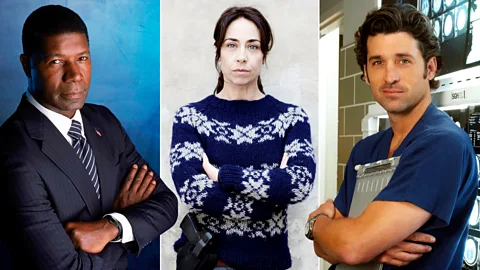 Alamy
AlamyGrey's Anatomy
With Grey's Anatomy, Shonda Rhimes didn't just give birth to the longest-running primetime medical drama in history, but gifted us with a truly culture-defying series. We've shed many tears over the very dramatic deaths of our favourite characters and rejoiced over the triumphs of the Grey Sloan Memorial Hospital doctors with every life they have saved or crisis they have averted. The strong women portrayed on screen have reigned, season after season. Meredith Grey (Ellen Pompeo), Cristina Yang (Sandra Oh) and Miranda Bailey (Chandra Wilson) paved the way for so many to follow, and stood as a beacon of hope for future formidable female protagonists. Never have I seen a friendship on TV as strong and irable as that between Meredith and Cristina. Diversity and inclusivity have also always taken centre stage on Grey's – something that made it groundbreaking when it started in 2005 – while its storylines have been empowering, and opened up a dialogue about domestic violence, mental illness and other issues. The series was always ahead of its time, and thus cemented itself as a pop-cultural phenomenon. We grew up with Grey's as a comfort blanket and – in dramatic Grey's fashion – I'm preparing for the unimaginable loss once the show runs its course.
Marriska Fernandes, freelance film and TV critic (Canada)
The Killing
Frankly, the original Danish title Forbrydelsen – try to pronounce this one three times in a row – sounded much better than The Killing. Still, this Danish crime series was so much more than an investigation into a couple of murders. All three seasons were multi-layered and grippingly dramatic, even when concerning Danish politics and economics. The Killing grew on the viewer like a forest full of secrets. Not only did Sofie Gråbøl make a mesmerising impression playing Sarah Lund, the woman with an awkward taste for colourful sweaters, but the plot twists were ground-breakingly complex in a series of this kind. Writer Søren Sveistrup brought screenwriting for television to a whole new level. It became a benchmark for future crime series, but this kind of excellence has rarely been equalled by its successors.
Ab Zagt, TV journalist, Algemeen Dagblad (The Netherlands)
24
The 21st Century had hardly begun when 24 was aired in 2001, first in the US, then around the world. Less than two months before, 9/11 happened and terrorism became an obsession (and an affliction), both in fiction and in real life. For better or for worse, the show created by Robert Cochran and Joel Surnow quickly became an addiction. Behind it there was a breakthrough formula: the idea of an event portrayed in real time, in which each instalment of the 24-episode season depicts one hour of a single day in the life of the Los Angeles Counter Terrorist Unit (CTU) special agent, played by Sutherland. Doesn't sound exciting enough? Try to imagine a weekly 45 minute-high-tech explosive ride, where no character is completely safe, and which always leads us to a cliff-hanger moment at the end of every hour.
Carlos Helí de Almeida, movie, TV and arts journalist, O Globo (Brazil)
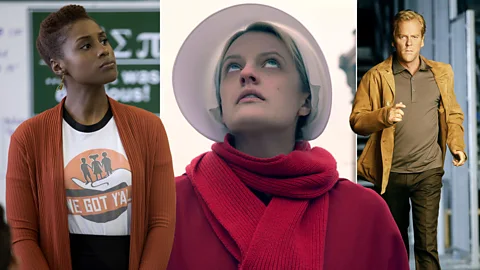 Alamy
AlamyThe Handmaid's Tale
Few series have had the unnerving social and political resonance of The Handmaid's Tale. Margaret Atwood's 1985 dystopian vision of the patriarchal state of Gilead, which enslaves fertile women, forcing them to give birth for their so-called Commanders, landed as a futuristic warning about threats to women's rights. By the time the drama based on that book arrived in 2017, it felt dangerously close to the reality of a world reeling towards authoritarianism. The Handmaids' costume of red cloak and white bonnet became an emblem, worn as protest at real-life women's marches in several countries, and especially in the US, where abortion rights are increasingly under threat. The series wouldn't speak to us so directly if it were not richly imaged, in its narrative about June, (Elisabeth Moss), the fierce Handmaid determined to resist Gilead, and in its dazzling colour-coded design, blue for Commanders' wives, drab brown for the turncoat Aunts like Lydia (Ann Dowd) who serve the state and oppress other women. Television always reveals something about who we are. The Handmaid's Tale goes beyond, to expose some essential truths about the culture, our hopes, and our worst fears.
Caryn James, Critic - BBC Culture (United States)
Insecure
In creating and developing Insecure for HBO, Issa Rae changed the landscape of modern television as we know it. What started as a web series and memoir, The Misadventures of Awkward Black Girl, grew into a calling card for Rae, who made history in Hollywood as the first black woman to write and star in a cable series. Her character's Issa's "misadventures" in Insecure – including her push-and-pull relationship with on-off boyfriend Lawrence, and her desire to find work fulfillment – reflected the nuanced experience of black, female millennials while, at its core, the show also allowed us a front row seat to the compelling dynamic between Issa and best friend Molly. The light and shade of their relationship developed over the series, until season four, where we found ourselves questioning whether they would make it or not. As has been noted by critics, Insecure is this generation's answer to series like Living Single and Girlfriends, updated for our sexting, Uber-taking times. And it does this all so gorgeously, with a striking cinematic feel, and a soundtrack that pulses in tribute to a culturally diverse Los Angeles.
Nadia Neophytou, freelance journalist (United States)

I May Destroy You
I May Destroy You, by skilful design and outright daring, is as perfectly representative of this century in television and culture as exists anywhere. Over 12 episodes, Michaela Coel unfurls a stunning tale of what happens to a person after sexual assault, how the modern world amplifies and twists our innermost thoughts into knots, and why it can be so damn hard to understand the nuances of your own life, even as you're living it. With vivid visuals, sly jokes, and smart performances from Coel, Weruche Opia and Paapa Essiedu, I May Destroy You is as good as TV gets.
Caroline Framke, chief TV critic, Variety (United States)
Fleabag
Based on a monologue that Phoebe Waller-Bridge first performed on stage, Fleabag the TV series took the best parts of the original concept – a woman with all her flaws and faults on display – and fleshed them out. It added more nuance to the other characters, and carved out a space for Fleabag to exist. When Waller-Bridge broke the fourth wall, letting us in on her inner thoughts and just-between-us jokes, she drew us ever closer. Yes, she said crude things, and told us she was perverted and selfish, but we still saw bits of ourselves in her. She itted things we'd not heard itted on television before. She said out loud the things that bring us shame and guilt; the self-sabotage we inflict, the pressure we put on ourselves. More importantly, she made it okay to feel these things. At a time before conversations about mental health became as open as they are now, she laid it all out on the table – unabashedly so. In the second season, Waller-Bridge again brought us together in our sins, and her imperfect redemption became our own.
Nadia Neophytou, freelance journalist (United States)
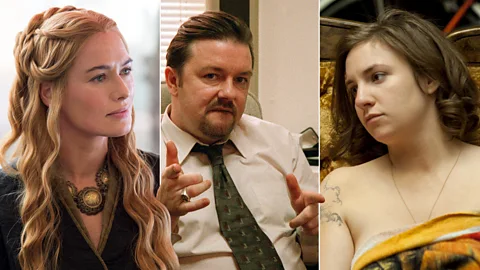 Alamy/ BBC
Alamy/ BBCThe Office (UK)
I grew up watching British TV comedy series like Some Mothers Do 'Ave 'Em, which was very popular in Nigeria. The mix of wit, sarcasm and self-deprecation of British humour has always appealed to me. The most appealing out of the bunch in recent times is The Office (UK), in which the wacky David Brent sets the tone for a show that delivers comedy gold with intimate humour. The Office is relatable, with many of the characters reminding us of the people we have worked with or bosses we've had, and that is why I consider it a great series. The mockumentary approach adds a layer of realism that pulls you into the world of the Wernham Hogg paper company, and its US spin-off became one of the best American TV shows of all time.
Ayomide Tayo, TV journalist, Opera News (Nigeria)
Girls
Almost a decade after its pilot aired on HBO, Lena Dunham's Girls is a curious time capsule. The show was praised for its candid depictions of sex, money, and work. It made Dunham, as her protagonist Hannah Horvath puts it, the voice of her generation – or, at least, a voice of a generation. But the show was also endlessly criticised for its whiteness and WASPiness. Girls was never meant as an all-encoming portrait of millennial women. It was a satire about white privilege and 21st-Century egotism. But because it was also one of the few semi-realistic depictions of urban Gen-Y life, viewers expected something the show was never keen on providing. This miscommunication, heightened by a horde of instantaneous think pieces, unfairly taints Girls' legacy. Watching Girls now, it is easier to just enjoy its superb writing, iconic song choices and would-be film star Adam Driver at his nastiest. It also paved the way for other generational voices. Would we have I May Destroy You, Fleabag, or Master of None were it not for Hannah Horvath playing topless ping-pong? I think not.
Anton Vanha-Majamaa, freelance TV journalist (Finland)
Game of Thrones
Dragons. Mad kings. Blood. Gore – and a riveting story of kingdoms won and lost. Game of Thrones kept us gripped for eight years over eight long seasons, during which the story of the Iron Throne and the dysfunctional families that laid claim to it held us spellbound with their shenanigans. In Nigeria, we stayed up to catch new season premieres as late as 2am. Game of Thrones redefined television, coming as it did after various amazing prestige shows. But it had something else. It had heft. It had gravitas. It was epic, spectacular and grand. As a chronicle of nobles and commoners, blind loyalty and deception, vaunting ambition and epic fails, romance and forbidden love, Game of Thrones could be compared to Shakespeare meets Night of the Living Dead and The Day After Tomorrow; a post-apocalyptic fantasy masquerading as a period drama. It was also a sublime cinematic experience that had global mass appeal.
Toni Kan, writer and culture critic, thelagosreview.ng (Nigeria)
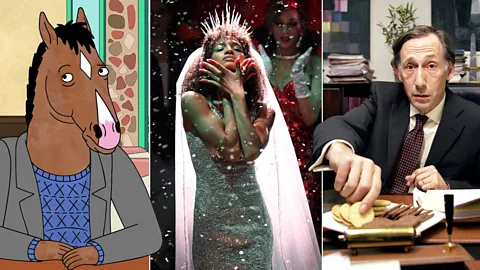 Alamy
AlamyPose
Pose is more than just a TV show. As the first series to truly celebrate trans women of colour, its very existence makes a vital statement, one that holds more power to change the world than that of perhaps any other show on this list. Like Blanca and the other queer trailblazers in this story, Pose co-creator Steven Canals fought rejections time and time again to create a safe space for LGBTQ+ viewers who had never seen themselves reflected on screen before. "You have to shine so bright out there that they can't deny you," says Blanca. And Pose taught us how to do exactly that. To live our truth, to thrive as queer people, because the right kind of representation doesn't just help marginalised groups feel seen. It can inspire people to live their truth, even in the face of overwhelming adversity. And in the right circumstances, shows like Pose can even save lives.
David Opie, TV journalist, Digital Spy (UK)
BoJack Horseman
At first glance, it is easy to write off the seemingly simple, quirky, and cartoon world of Hollywoo. If you are like me, the first several episodes were tough to get into; BoJack is neither charming nor likeable, and I'm supposed to watch him for six seasons? Yes, you are, and not only are you going to watch a grown man (or horse) throw his life away as he spirals out of control into an inevitable abyss of loneliness, but you are going to love every second of it. Like it or not, BoJack Horseman forces you to question your own morality with the poignant care of an ex-lover. BoJack is reminiscent of my first experience with rollercoasters: I, unknowing of what was in store, chose to get on, and once it started, no amount of screaming or crying would let me off early. And then I bought another ticket.
Daniel Tihn, TV journalist, The Times of Malta (Malta)
The Thick of It
The early part of the new century was marked by a heinous trend of "new optimism" in US comedy, where spiritual redemption was available to even the least deserving. On the opposite end of the spectrum was The Thick of It, Armando Iannucci's caustic UK satire, the central premise of which was that everyone involved in government were contemptible halfwits interested purely in self-preservation. Showcasing ever more inventive ways in which powerless politicians and useless civil servants can create monumental crises out of molehills, the show made a star of Peter Capaldi (years after he had won an Oscar for a short film he directed), whose scathing spin doctor Malcolm Tucker frantically rampaged through Westminster like a foul-mouthed Godzilla. Any faith in politics was confidently and certainly rebuked.
Ali Arikan, freelance film critic (Turkey)
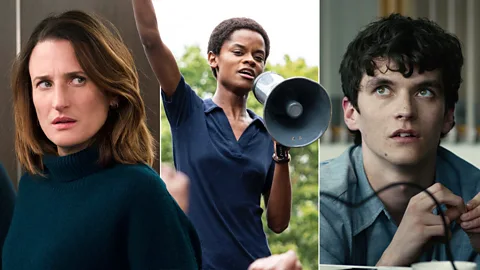 Black Mirror
Black MirrorBlack Mirror
Black Mirror has become a worldwide cultural phenomenon in an era dominated by binge-watchable serial dramas; no small feat for an anthology show defined by themes rather than continuing story arcs. The thought-provoking, speculative plots of Charlie Brooker's creation, alongside terrific performances, have made the show a byword for the anxieties related to technological progress, and underlining the show is the ever-present question: "have we gone too far">window._taboola = window._taboola || []; _taboola.push({ mode: 'alternating-thumbnails-a', container: 'taboola-below-article', placement: 'Below Article', target_type: 'mix' });
